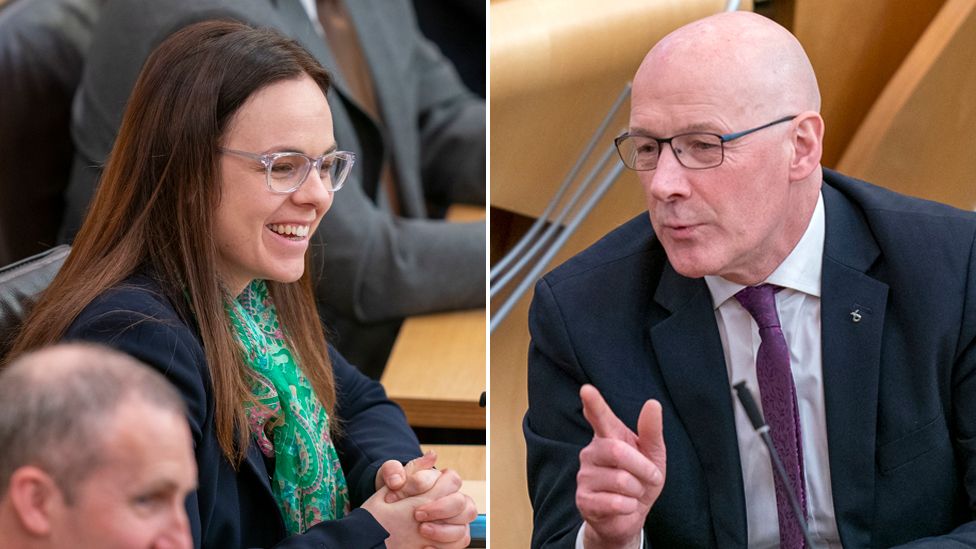ARTICLE AD BOX
 Image source, PA Media
Image source, PA Media
Kate Forbes and John Swinney are both considering SNP leadership bids
By Angus Cochrane
BBC Scotland News
The two frontrunners to succeed outgoing First Minister Humza Yousaf have held informal talks.
John Swinney and Kate Forbes met on Tuesday, according to a spokesperson for Ms Forbes.
Both have said they are considering a bid for the leadership, though neither has confirmed they are running.
Nominations for the role close on Monday. A contest will be held if more than one candidate gets sufficient support.
News of the meeting emerged on Wednesday as the Scottish government survived a motion of no confidence that could have forced all SNP ministers to resign.
"We can confirm Kate spoke to John yesterday," a spokesperson for Ms Forbes, the former finance secretary, said.
"It was a purely informal meeting. Kate is continuing to weigh up whether to run and is grateful for the growing outpouring of support."
Speaking earlier, Ms Forbes said she "fundamentally disagreed" with any suggestion she would not have enough parliamentary party support to become SNP leader, having narrowly lost out to Mr Yousaf in last year's contest to replace Nicola Sturgeon.
Ms Forbes said she was "listening just now and not ruling anything out".
Image source, PA Media
Image caption,Kate Forbes was defeated by Humza Yousaf in last year's leadership contest
Mr Swinney, the former deputy first minister, told reporters at Holyrood: "I will not be rushed into making decisions that affect my loved ones."
He denied there was a stand off between potential leadership candidates.
"It's about people taking the time to make the right decisions for those they love," he said.
Mr Swinney has been backed by a number of senior party figures, including Westminster leader Stephen Flynn, deputy leader Keith Brown and cabinet ministers Neil Gray, Shirley-Anne Somerville and Mairi McAllan.
Image source, PA Media
Image caption,John Swinney has been backed by senior SNP figures
Ms Forbes has been publicly supported by ex-ministers Fergus Ewing and Ivan McKee, as well as backbench MP Joanna Cherry.
Allies of Ms Forbes told BBC Scotland News she had made progress planning a potential leadership bid, including on policy positions and resources, in case she decided to stand.
Her supporters said she was not expected to make an announcement on Wednesday as it had only been 48 hours since Mr Yousaf announced his resignation.
Ms Sturgeon, speaking to journalists at Holyrood, said: "I'll make up my own mind, I'm not going to tell other members how to vote.
"What I would say is that I hope the contest is positive, I hope it is forward-looking, and I hope it focuses on the things the SNP needs to do to continue it's very strong election-winning streak."
Image source, PA Media
Image caption,Nicola Sturgeon has not publicly backed either of the frontrunners
Ms Forbes, who narrowly lost out to Mr Yousaf in the 2023 leadership contest, was criticised during the campaign for revealing she would have voted against gay marriage legislation had she been an MSP at the time due to her religious beliefs as a member of the Free Church of Scotland.
At the time, Mr Swinney, also a Christian, questioned whether it would be "appropriate" for someone with such views to become SNP leader.
Speaking to BBC Radio Scotland's Drivetime programme, Mr Ewing urged Mr Swinney to retract those comments.
Nominations for the SNP leadership opened on Monday and close one week later. If more than one candidate receives 100 nominations from at least 20 local party branches, a ballot will be held among members to choose a new leader.
Mr Yousaf has said he will resign as first minister once a new leader is chosen. At that point, parliament will have 28 days to nominate a new first minister to be appointed by the King.
If MSPs cannot reach an agreement after 28 days, a snap election would be called.
Speaking for the first time since announcing his resignation, Mr Yousaf said he had "paid the price" for the way he ended the SNP's power-sharing deal with the Scottish Greens.
He told BBC News ending the Bute House Agreement was the "right decision".
"But I have to acknowledge the manner in which I did it caused great upset and that's on me," he said.
A motion of no confidence in his government, which would have forced all SNP ministers to resign, was defeated by 70 votes 58 in the Scottish Parliament on Wednesday.
The result was in little doubt after the Greens, whose votes would be required to give the opposition a majority, called for it to be withdrawn following the first minister's resignation announcement.
If it had passed, the motion would have compelled the entire government to resign, with parliament given 28 days to nominate a new first minister. Failing that, a snap election would have been called.

 11 months ago
32
11 months ago
32








 English (US) ·
English (US) ·